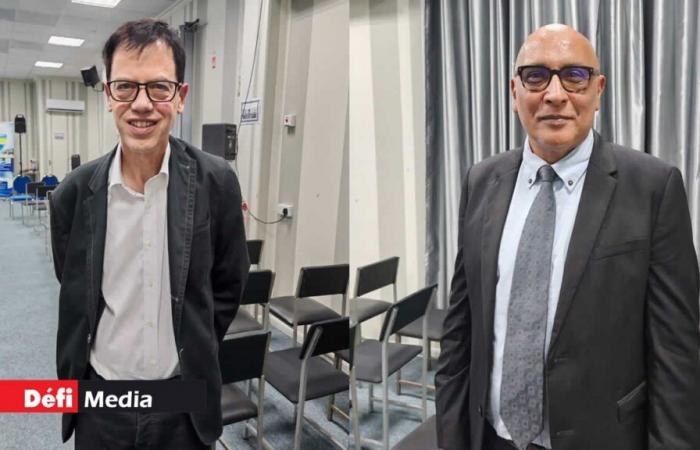The Mauritian clinic has initiated a project to make precision medicine a reality for the treatment of metabolic diseases, in collaboration with French experts. The latter are currently present in Mauritius to present the first research carried out and explore the possibilities of developing personalized treatment for local patients.
Mauritius is among the most affected countries in the world by diabetes. A plague of public Health that worries specialists, including Professor Philippe Froguel, researcher, and Dr Suren Budhan, specialist in public health. Both call for a collective start in the face of a situation they deem alarming, but reversible.
“There is a strong genetic component in type 2 diabetes, and populations from India – like a large part of Mauritians – are particularly vulnerable. It is therefore essential to study their genes to adapt prevention, screening and treatments, ”says Professor Froguel. The latter says he is worried by the local situation. The French researcher believes that “Mauritius is one of the countries of the world most seriously affected by type 2. diabetes. We are talking about a silent epidemic which affects almost one in four adults. It is not sustainable in the long term ”.
Currently visiting Mauritius, Professor Philippe Froguel, endocrinologist, research director at CNRS (France) and professor at the Imperial College in London, introduces the first research carried out around genetic screening. It is accompanied by the DRE Amélie Bonnefond, laboratory director at CNRS/EGID (European Genomic Institute for Diabetes). Together, they participate in conferences, workshops and meetings with the health authorities until Saturday May 3.
The objective: to lay down the foundations for collaboration around genetic screening and the development of personalized medicine in Mauritius. This visit, organized in partnership with the service of metabolic diseases Odhir – obesity, diabetes, hypertension, renal failure – of the Mauritian clinic, marks a key stage in the development of precision medicine in Mauritius, according to Dr Suren Budhan, doctor at the Mauritian clinic and project facilitator.
A revolution in the medical diagnosis
The central point of this initiative is based on genetics. Researchers announce that they have discovered genes associated with metabolic diseases in Mauritian patients, including obesity, diabetes and renal failure. These discoveries will make it possible to establish much more precise, personalized and accessible diagnostics, thanks to the use of advanced genomics technologies.
By identifying these genetic predispositions, precision medicine offers a 4P approach: predictive, preventive, personalized and participative. This new medical vision aims to treat more effectively, while reducing costs for the health system. Professor Froguel’s program started with a conference, held on Monday, April 28 at the Open University on the theme: “The genetics of metabolic diseases in Mauritius: a glow for us and for the world”.
-Several official meetings with the Minister of Health and that of Higher Education are also planned. The goal: to have a multidimensional collaboration allowing the training of local doctors and the revision of certain laws, if necessary, to allow genetic research to deepen. “We have a young, connected population, and a remarkable capacity for innovation. If we act now, we can save thousands of lives and avoid billions of medical care expenditure in the coming years, “said Dr. Suren Budhan.
In addition, this Franco-Mauritian collaboration, carried out under the aegis of the Précidiad Foundation (CNRS/EGID) and the Mauritian clinic, which is also a foundation, aims to establish a telemedicine platform. This system will allow collaborative and continuous care between French experts and local teams. Professor Froguel has also offered the implementation of a training program, a university diploma on precision medicine and around thirty doctors can be trained each year.
Understanding precision medicine
Precision medicine, also called personalized medicine, is a modern approach that revolutionizes the way of preventing, diagnosing and treating diseases. It is based on the idea that each individual is unique, and that medical treatments must take into account his own characteristics, in particular his genetic heritage, his lifestyle, his environment or even his family history.
In the case of diabetes, this approach makes it possible, for example, to identify people who have a genetic predisposition very early on, long before it manifests. Thanks to tools such as DNA sequencing, it then becomes possible to adopt tailor -made prevention strategies, or to offer treatments better suited to each profile.
The first Mauritian patients concerned
During his last visit to Mauritius, about 18 months ago, Professor Philippe Froguel began a study on several Mauritian patients with diabetes, some of whom already had advanced complications. Thanks to the sequencing of the genome, and in collaboration with the doctors of the Mauritian clinic, it was possible to better understand their profiles and to adapt their medical care.
“This opens very great hopes in what is called personalized medicine. Instead of simply treating symptoms, we are trying to determine in depth why some people become diabetics. We also want to understand why a large number of Mauritians develop metabolic diseases very early in life. Based on this genetic data, we can set up a real targeted prevention, especially within risky families. Thus, treatments can thus be much more suitable for each patient, ”explains Professor Froguel.
Since then, the unit of precision medicine of the Mauritian clinic began to follow the first patients under this innovative approach. “We have obtained very encouraging results over fifteen samples. For example, a patient was able to stop insulin in favor of oral treatment, much less expensive. Another patient of Indo-Mauritian origin, on the other hand, will be able to abandon an expensive treatment to benefit from a much more targeted and personalized solution, ”underlines Dr. Suren Budhan.








